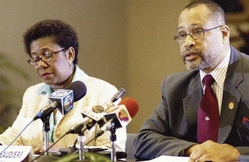Negotiation by video - BOJ governor says fully engaged in IMF talks, has no plans to quit
Published: Wednesday | July 15, 2009

( L - R ) Myrtle Halsall and Derick Latibeaudiere, the Bank of Jamaica governor. File photo
Bank of Jamaica Derick Latibeaudiere on Tuesday rejected as "laughable" thinly veiled suggestions that his absence from talks under way in Washington with the International Monetary Fund (IMF) was indicative of any sort of rift with the administration, saying those who make such charges fail to appreciate technological advances and the efficiencies they create.
The governor was equally contemptuous of talk that gained in volume on the weekend that he and the Ministry of Finance had a difference over interest-rate policy, and that he was about to demit office in protest.
"That is pure foolishness," said Latibeaudiere. Any suggestion that he was about to quit, he added, "would be a pipe dream."
Latibeaudiere, speaking with Wednesday Business from his offices at the central bank in Kingston, said not only was he represented in Washington by his Deputy Governor, Myrtle Halsall, but that he is involved in discussions with the multilateral agency - and has been for months - via videoconferencing and telephone.
"I am not aware of any rift whatsoever," the central bank chief said. "As a country, we need to grow up and stop talking foolishness."
Jamaica is in the throes of negotiations with the fund to re-establish a borrowing arrangement to shore up its depleting foreign reserves and stem what the Government sees a worsening balance of payments problem.
Central bank forecasts
The central bank forecasts that the foreign reserves will remain flat at US$1.6 billion this year, relative to the US$1.62 billion at the end of fiscal 2008/09, but Senator Don Wehby, minister without portfolio in the finance ministry, said that in a worst-case scenario, the NIR could drop to US$800 million.
The economy is expected to contract by another three per cent, by official estimates, though analysts are already predicting it would be closer to four or five per cent.
Since Wehby's statement, foreign exchange receipts from tourism, bauxite and remittances have plunged, the latter by about 17 per cent.
Jamaica could potentially gain special drawing rights that would allow access to some US$1.2 billion over three years, if the parties can agree on the conditionalities to be attached to the borrowing arrangement.
Asked to clarify varying reports that the talks were preliminary on one hand and advanced on the other, Latibeaudiere said the negotiating team "has gone a long way to define elements of the financial programme".
The negotiations in Washington are being led by Senator Wehby - who departs government service at the end of this month - drawing criticisms and questions from the political opposition on why the talks are not being handled personally by Finance Minister Audley Shaw.
The Opposition also claimed that the BOJ technical team was not involved in the discussions, declaring it an "ominous" sign.
Shaw rejected those claims on the weekend as political grandstanding, while Latibeaudiere suggested Tuesday that such talk served only to have outsiders label Jamaica as unschooled in how parties interface during negotiations and created a negative image of the country.
The central banker said not only were discussions with the IMF ongoing for three to four months, but that the central bank was well represented by a technical team in Washington, the most senior of whom was Halsall.
The BOJ governor did not claim to be in total agreement with the Ministry of Finance - adding that fiscal and monetary authorities often are not - but where the IMF negotiations are concerned, he added, the two are in concert.
"In all countries across the globe, there is always some level of difference over fiscal and monetary policy."
Diplomatic stance
Pushed on whether he would resist any move to limit his power over the foreign exchange market, particularly his interventions, under the negotiated IMF agreement, Latibeaudiere chose the more diplomatic stance, saying he would like to think that there would be allowance for interventions in a market characterised by peaks and troughs.
"No, we cannot pull back," he said. "But, the central bank has to be cognisant at all times that the exchange rate plays a major role in inflation and in terms of impacting prices."
Demand for foreign exchange tends to rise in the summer while supplies are low, creating liquidity problems and "may require more intervention" that in the January to April periods, supplies are usually higher.
"So, if we don't manage according to seasonality, that would not be wise. At the end of the day, we would have disjuncture in the system," said Latibeaudiere.
What was important, he said, was not so much control of the system, but the management of the exchange rate.
"Instability is not something we should tolerate."
It was that commitment to keeping the Jamaican dollar from free fall - the currency fell 13 per cent last year, which was three times the normal rate of depreciation - that pushed the central bank governor to increase open market rates on central bank securities, after months of tapping the NIR to defend the JMD produced no real result except to diminish the reserves from its peak of US$2.2 billion.
The move sparked a verbal tussle over interest rates, led by businesses for whom the cost of debt capital rose, but who were also faced with a shortage of foreign exchange at the top of the year to pay for raw materials and other imports.
Latibeaudiere refused to back down, however, but did eventually suspend the sale of its one-year certificate of deposit.
The six-month CD remains at 21.5 per cent, less than 50 basis points above the six-month treasury at 21.05 per cent.
The weekend chatter surrounding Latibeaudiere's alleged imminent departure from office is the second time that such rumours have surfaced since the Golding administration came to power in 2007.
lavern.clarke@gleanerjm.com





















